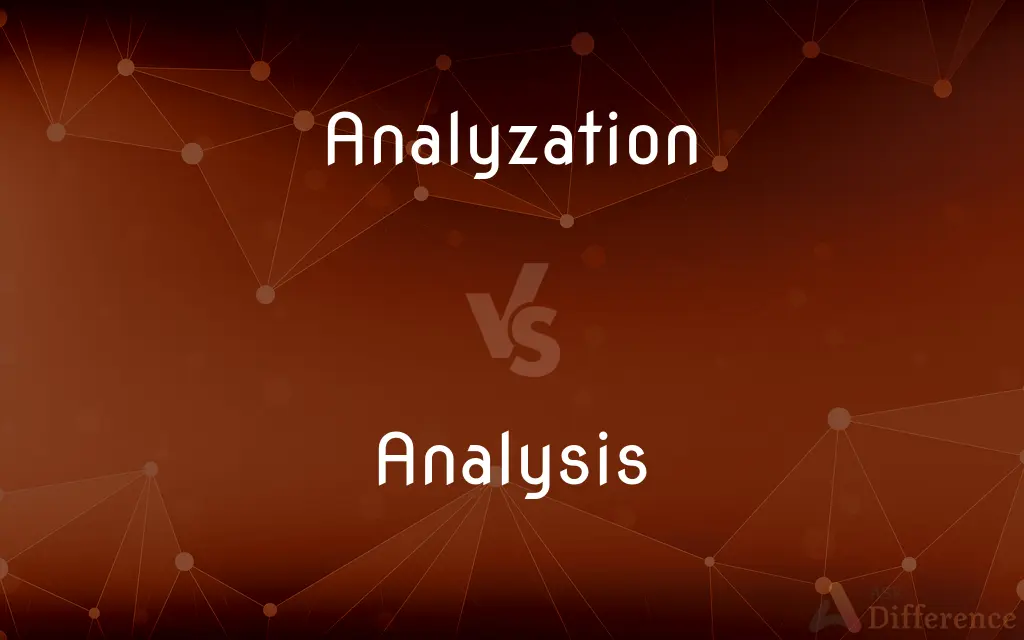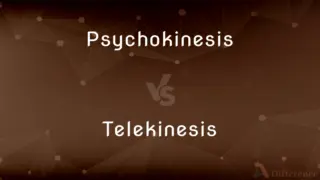Analyzation vs. Analysis — What's the Difference?
By Tayyaba Rehman — Updated on September 4, 2023
Analyzation and Analysis both refer to the process of examining in detail, but "Analysis" is the widely accepted term, while "Analyzation" is less commonly used.

Difference Between Analyzation and Analysis
Table of Contents
ADVERTISEMENT
Key Differences
Analyzation and Analysis both originate from the verb "analyze." While Analyzation has the suffix "-ation," which is often used to form nouns of action, Analysis is formed using the suffix "-is," and has its roots in Greek.
Analyzation is the act or process of analyzing. It's a noun form of the verb "analyze" just as Analysis is. While both words technically serve the same purpose, their usage differs. Analysis is more commonly used in academic, professional, and everyday language.
It is believed by some that Analyzation is a modern, and somewhat unnecessary, variant of Analysis. However, language is dynamic, and new forms can arise. Still, Analysis is favored in most formal contexts.
Linguistically, Analyzation is a regular formation from the verb "analyze," but it's redundant since Analysis already exists and has the same meaning. Both words could theoretically be used interchangeably, but Analysis has a longer history and is more standard.
The choice between Analyzation and Analysis might also be influenced by regional variations, style guides, or personal preferences. Still, it's advised to stick with Analysis in most writing contexts for clarity and brevity.
ADVERTISEMENT
Comparison Chart
Origin
Derived from "analyze" with "-ation"
Derived from Greek, with the "-is" suffix
Common Usage
Less common
Widely accepted and used
Linguistic Form
Regular formation
Traditional and standard form
Preference in Formal Writing
Less preferred
Highly preferred
Nuance
Seen as modern and redundant variant
Established and conventional term
Compare with Definitions
Analyzation
Analyzation is the interpretation of specific details.
Her analyzation of the film differed from mine.
Analysis
Analysis is a detailed examination of the components of a subject.
The analysis of the sample confirmed its purity.
Analyzation
Analyzation refers to the scrutiny of a particular subject.
His analyzation of the artwork was impressive.
Analysis
Analysis is the process of studying the nature of something.
Through careful analysis, he identified the problem.
Analyzation
Analyzation is the detailed examination of something.
Her analyzation of the data was thorough.
Analysis
Analysis refers to breaking something down to understand it.
An analysis of the text revealed the author's intent.
Analyzation
Analyzation is the process of breaking something down into its components.
The analyzation of the sentence revealed its structure.
Analysis
Analysis is an interpretation or exploration of a particular topic.
Her analysis of the situation was insightful.
Analyzation
Analyzation is a systematic study of elements or structure.
The analyzation of the poem uncovered its deeper themes.
Analysis
Analysis is a systematic evaluation or assessment.
The financial analysis showed the company's strengths and weaknesses.
Analyzation
To examine methodically by separating into parts and studying their interrelations.
Analysis
Analysis is the process of breaking a complex topic or substance into smaller parts in order to gain a better understanding of it. The technique has been applied in the study of mathematics and logic since before Aristotle (384–322 B.C.), though analysis as a formal concept is a relatively recent development.The word comes from the Ancient Greek ἀνάλυσις (analysis, "a breaking-up" or "an untying;" from ana- "up, throughout" and lysis "a loosening").
Analyzation
(Chemistry) To make a chemical analysis of.
Analysis
Detailed examination of the elements or structure of something
Statistical analysis
An analysis of popular culture
Analyzation
(Mathematics) To make a mathematical analysis of.
Analysis
Short for psychoanalysis
Other schools of analysis have evolved out of the original disciplines established by Freud
Analyzation
To psychoanalyze.
Analysis
The separation of an intellectual or material whole into its constituent parts for individual study.
Analyzation
(rare) analysis
Analysis
The study of such constituent parts and their interrelationships in making up a whole.
Analyzation
The act of analyzing, or separating into constituent parts; analysis.
Analysis
A spoken or written presentation of such study
Published an analysis of poetic meter.
Analysis
The separation of a substance into its constituent elements to determine either their nature (qualitative analysis) or their proportions (quantitative analysis).
Analysis
The stated findings of such a separation or determination.
Analysis
A branch of mathematics principally involving differential and integral calculus, sequences, and series and concerned with limits and convergence.
Analysis
The method of proof in which a known truth is sought as a consequence of a series of deductions from that which is the thing to be proved.
Analysis
(Linguistics) The use of function words such as prepositions, pronouns, or auxiliary verbs instead of inflectional endings to express a grammatical relationship; for example, the cover of the dictionary instead of the dictionary's cover.
Analysis
Psychoanalysis.
Analysis
Systems analysis.
Analysis
(countable) Decomposition into components in order to study (a complex thing, concept, theory etc.).
Analysis
(countable) The result of such a process.
Analysis
The mathematical study of functions, sequences, series, limits, derivatives and integrals.
Mathematical analysis
Analysis
Proof by deduction from known truths.
Analysis
The process of breaking down a substance into its constituent parts, or the result of this process.
Analysis
The analytical study of melodies, harmonies, sequences, repetitions, variations, quotations, juxtapositions, and surprises.
Analysis
Psychoanalysis.
Analysis
A resolution of anything, whether an object of the senses or of the intellect, into its constituent or original elements; an examination of the component parts of a subject, each separately, as the words which compose a sentence, the tones of a tune, or the simple propositions which enter into an argument. It is opposed to synthesis.
Analysis
The separation of a compound substance, by chemical processes, into its constituents, with a view to ascertain either (a) what elements it contains, or (b) how much of each element is present. The former is called qualitative, and the latter quantitative analysis.
Analysis
The tracing of things to their source, and the resolving of knowledge into its original principles.
Analysis
The resolving of problems by reducing the conditions that are in them to equations.
Analysis
A syllabus, or table of the principal heads of a discourse, disposed in their natural order.
Analysis
The process of ascertaining the name of a species, or its place in a system of classification, by means of an analytical table or key.
Analysis
An investigation of the component parts of a whole and their relations in making up the whole
Analysis
The abstract separation of a whole into its constituent parts in order to study the parts and their relations
Analysis
A form of literary criticism in which the structure of a piece of writing is analyzed
Analysis
The use of closed-class words instead of inflections: e.g., `the father of the bride' instead of `the bride's father'
Analysis
A branch of mathematics involving calculus and the theory of limits; sequences and series and integration and differentiation
Analysis
A set of techniques for exploring underlying motives and a method of treating various mental disorders; based on the theories of Sigmund Freud;
His physician recommended psychoanalysis
Common Curiosities
Which word, Analyzation or Analysis, is more commonly used?
Analysis is more commonly used than Analyzation.
Can I use Analyzation and Analysis interchangeably in academic writing?
While both convey the same meaning, Analysis is more widely accepted in academic contexts.
Are there any grammatical differences between Analyzation and Analysis?
Both are nouns, but they're derived from different linguistic processes.
Is Analyzation a correct English word?
Yes, Analyzation is a word, but it's less standard than Analysis.
Is it incorrect to use Analyzation?
No, but it's less standard than Analysis.
Why is there redundancy in having both Analyzation and Analysis in the language?
Language evolves, and redundant forms can arise. But it's always good to know which form is more standard.
Are the meanings of Analyzation and Analysis the same?
Essentially, yes. Both refer to the detailed examination or evaluation of something.
Why is Analysis more preferred than Analyzation?
Analysis has a longer historical usage and is seen as more standard in formal contexts.
Can I use Analyzation in professional communication?
While it's understandable, Analysis is the more accepted term in professional contexts.
Does Analyzation have any specific contexts where it's more appropriate than Analysis?
Not necessarily, but personal or regional preferences might favor Analyzation in informal contexts.
What's the origin of the word Analysis?
Analysis originates from Greek.
Are there any other terms similar to Analyzation and Analysis?
Yes, many verbs that end in "-ize" can form nouns with "-ization," but not all have a counterpart like "Analysis."
How do I decide between using Analyzation and Analysis?
Consider your audience and the formality of the context. In most cases, Analysis is the safer choice.
Is Analyzation a modern term?
Some view Analyzation as a more modern, though redundant, variant of Analysis.
Can Analyzation and Analysis be used in all the same grammatical structures?
Yes, since both are nouns, they fit into sentences in the same way. But always consider the standard usage.
Share Your Discovery

Previous Comparison
Psychokinesis vs. Telekinesis
Next Comparison
Pen vs. PinAuthor Spotlight
Written by
Tayyaba RehmanTayyaba Rehman is a distinguished writer, currently serving as a primary contributor to askdifference.com. As a researcher in semantics and etymology, Tayyaba's passion for the complexity of languages and their distinctions has found a perfect home on the platform. Tayyaba delves into the intricacies of language, distinguishing between commonly confused words and phrases, thereby providing clarity for readers worldwide.
















































